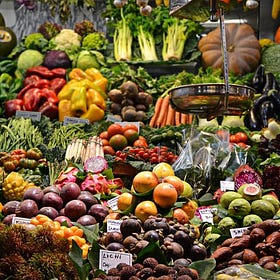The Chemical Reactions Occurring In Our Body During Digestion.
An exploration of what we don’t really ruminate on as we're eating.
We tend to think of our digestive system at a very simple level. We eat food, our stomach acids break it down, our intestines absorb it, and whatever isn’t absorbed is excreted into the toilet bowl.
Unfortunately, life isn’t that simple. There are many more chemical reactions that are ongoing within the body — to an extent that we may not even be aware of them!
Lipid peroxidation is something that we definitely do not think about.
One of these key reactions that occur in the food that we eat is lipid peroxidation. This reaction occurs when an unsaturated fatty acid reacts with a pro-oxidant species to form an unstable lipid peroxide, and this lipid peroxide can decompose further into toxic by-products.
As it is said in this research article,
The stomach acts as a bioreactor and is an excellent medium for enhancing lipid peroxidation, generation of free radicals, secondary lipid peroxidation products and co-oxidation of vitamins.
The stomach environment does not only break down complex food particles — it also promotes lipid peroxidation.
But what can these lipid peroxide products do?
The same article also mentions that:
Red-meat lipid peroxidation in the stomach results in postprandial oxidative stress (POS) which is characterized by the generation of a variety of reactive cytotoxic aldehydes including malondialdehyde (MDA). MDA is absorbed in the blood system reacts with cell proteins to form adducts resulting in advanced lipid peroxidation end products (ALEs), producing dysfunctional proteins and cellular responses. The pathological consequences of ALEs tissue damage include inflammation and increased risk for many chronic diseases that are associated with a Western-type diet.
We’d therefore be looking at an issue of oxidative stress in the case of red meat lipid peroxidation. Reactive chemicals such as MDA are produced, and MDA can react with cell proteins to cause them to lose their function, which also ends up impairing a healthy cellular response.
As a result, if we are consuming too many foods that promote lipid peroxidation, the pro-inflammatory transcription pathways (such as the nuclear factor kappa B, or NF-κB pathway) that signal a higher risk of chronic diseases are upregulated.
The use of unsaturated fats for frying foods at high temperatures can also contribute to lipid peroxidation prior to the ingestion of the fried foods. Hence, fried foods also do pose a risk for lipid peroxidation.
I mean, partially hydrogenating these unsaturated fats into margarine can be bad enough:
Why Hydrogenated Vegetable Oil Isn't Good News For Our Health.
We’ve had butter around for so long. Some say it was discovered in 8000 BC in ancient Africa, when a sheepskin container of milk was jostled around in land travel, resulting in the development of a curdled mixture that became known as butter. Indian cuisine makes extensive use of a clarified butter known as
Too much lipid peroxidation leads into oxidative stress
And when we’ve got too much of these lipid peroxide products swimming about in our body, it gets into a stage of oxidative stress:
Oxidative Stress Is An Electrochemical Concept That Focuses On An Inappropriate Rate Of Electron Transfer.
The electron is a particle that is responsible for transporting electric currents. Whenever we flick a light switch on at home, we’re connecting up a circuit that allows for the flow of electrons to power up a device that can then convert that electrical energy into light energy, such that our houses get illuminated.
Which, of course, leads on to an imbalanced inflammatory response that affects our immune system’s functions:
Inflammation — Like It Or Not, It’s Here To Stay.
It would suffice to say that the word “inflammation” is causing quite a stir these days. When we’re injured, for instance, the site of injury is experiencing acute inflammation, and that contributes to unpleasant sensations of pain and swelling that we can feel
And that’s why eating all those unhealthy foods aren’t too good for our health! The many different chemical reactions can cause problems with our bodies. Even in Singapore, Traditional Chinese Medicine (TCM) practitioners do have a concept of what foods are “heaty” and what foods are “cooling”, and it’s not surprising to see that the “heaty” foods are of a more pro-inflammatory nature.
Even the consumption of charred foods can be problematic.
Some foods do contain higher levels of polycyclic aromatic hydrocarbons (PAHs), such that:
Processed food (through smoking) and cooked food (charcoal cooked) also contribute substantially to the intake of PAHs. The type of cooking, cooking temperature, time, amounts of fat, and oil influence the formation of PAHs.
Because these PAHs can be metabolised by the liver into reactive epoxides, which can then disrupt cellular DNA, and we’d end up with the idea that charred foods can cause cancer.
Do Charred Foods Really Cause Cancer?
I believe that people in most households would have fiddled around with Araldite adhesives before. They’re quite useful for gluing things together.
Awareness of what we’re eating is key
We do need to understand that there will be various other reactions happening when our food is being digested and that these are just part of the numerous reactions that happen uncontrolled.
This is one reason why some drugs and omega-3 supplements are manufactured with enteric coatings that do not decompose in the stomach environment but will decompose in the intestines to allow for the absorption of the product in an un-peroxidized form — we don’t really want the unsaturated omega-3 fatty acids to fully undergo lipid peroxidation in the stomach now, do we?
But who would have thought that we could get such a sequence of events just by eating all that unhealthy food consistently over a long period of time?
Do feel free to check out What Nutrients Support Digestion And Detox In Our Body to see how we can feed ourselves better to support the digestion process!
What Nutrients Support Digestion And Detox In Our Body?
The digestion of any food or other substances that we ingest, as well the subsequent elimination of these products from our digestive system undergoes a relatively complex mechanism.
Also, do feel free to share this article and hit the “subscribe” button to get more updates about the science concepts in nutrition and health, all deconstructed nicely for your convenient perusal!









